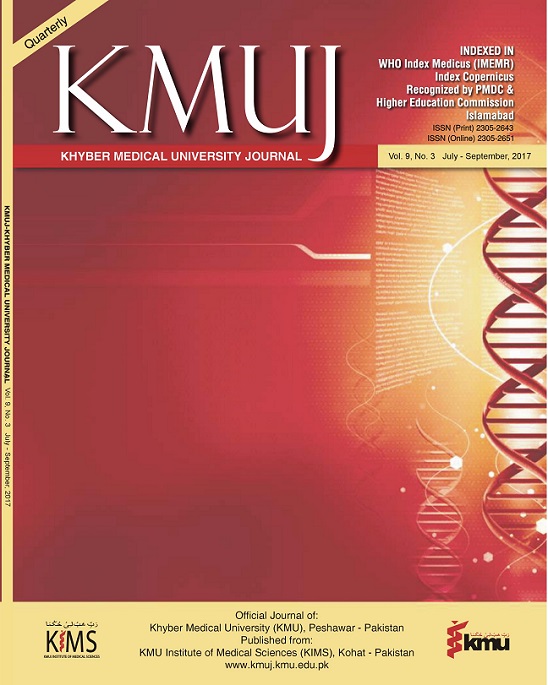ASSOCIATION OF RESEARCH ETHICS KNOWLEDGE WITH PREVIOUS RESEARCH EXPOSURE AND ACADEMIC QUALIFICATION AMONG FOOD AND NUTRITION GRADUATES IN PAKISTAN
Main Article Content
Abstract
OBJECTIVES: to assess the knowledge and attitude regarding research ethics and its association with previous research exposure and academic qualification among food and nutrition graduate students of Pakistan.
METHODS: This cross-sectional survey was conducted from April-May 2016. A structured-questionnaire was e-mailed to food and nutrition students from different cities of Pakistan. The questionnaire had four parts; demography, prior exposure to research, knowledge and attitude regarding research ethics. Chi-Square Test and Fisher’s Exact test were applied to assess association and data were analyzed using Statistical Package for Social Sciences (SPPS) version 20.
RESULTS: The mean age of the participants was 28.964 +7.985 years (range 21-59). A total of 280/400 (70%) respondents completed the questionnaire. Majority (91.1 %) of the participants was females and 60% had completed post-graduate education. About 96.4% participants reported prior involvement in research but only 21.4% had international publications. More than 80% of the respondents stated that they had knowledge about key concepts of research ethics but only 41.1% knew about Nuremberg Code and 42.9% about Helsinki Declaration. Scenario-based statements assessing attitudes had mixed results. Previous exposure to research, training in research ethics, international publications, application to research ethics committee (REC), and being a post-graduate was associated with knowledge of ethical principles (p<0.05).
CONCLUSION: Self-reported knowledge was good but students lacked correct attitude. Post-graduate students and those with research experience had better knowledge regarding research ethics.
KEY WORDS: Knowledge (MeSH); Attitude (MeSH); Research (MeSH); Ethics (MeSH); Students (MeSH); Ethics Committees, Research (MeSH); Codes of Ethics (MeSH); Helsinki Declaration (MeSH).
Article Details
Work published in KMUJ is licensed under a
Creative Commons Attribution 4.0 License
Authors are permitted and encouraged to post their work online (e.g., in institutional repositories or on their website) prior to and during the submission process, as it can lead to productive exchanges, as well as earlier and greater citation of published work.
(e.g., in institutional repositories or on their website) prior to and during the submission process, as it can lead to productive exchanges, as well as earlier and greater citation of published work.
References
World Health Organization. Declaration of Helsinki. Bull World Health Organ 2001;79(4):373-4.
Nuremberg Code. Trials of War Criminals before the Nuremberg Military Tribunals under Control Council Law. Washington, D.C.: U.S. Government Printing Office. 1949;10(2):181-2.
Shah N. Ethical issues in biomedical research and publication. J Conserv Dent 2011;14(3):205-7.
Bhutta ZA. Ethics in international health research: A perspective from the developing world. Bull World Health Organ 2002;80(2):114-20.
Heitman E, Olsen CH, Anestidou L, Bulger RE. New graduate students’ baseline knowledge of the responsible conduct of research. Acad Med 2007 Sep;82(9):838-45.
Osungbade KO, Ogundiran TO, Adebamowo CA. Research Ethics Education among Graduate Students of the University of Ibadan, Southwest Nigeria. Br J Med Med Res 2014;4(14):2736-49.
Janakiram C, Gardens SJ. Knowledge, attitudes and practices related to healthcare ethics among medical and dental postgraduate students in south India. Indian J Med Ethics 2014;11(2):99-104.
El-Dessouky HF, Abdel-Aziz AM, Ibrahim C, Moni M, AbulFadl R, Silverman H. Knowledge, awareness, and attitudes about research ethics among dental faculty in the Middle East: A pilot study. Int J Dent. 2011;2011:694759. doi: 10.1155/2011/694759. Epub 2011 Jul 3.
Kandeel N, El-Nemer A, Ali NM, Kassem H, El-Setouhy M, Elgharieb ME, et al. A multicenter study of the awareness and attitudes of Egyptian faculty towards research ethics: a pilot study. J Empir Res Hum Res Ethics. 2011 Dec;6(4):99-108. doi: 10.1525/jer.2011.6.4.99.
Brown S, Kalichman MW. Effects of training in responsible conduct of research: A survey of graduate students in experimental sciences. Sci Eng Ethics 1998;4(4):487-98.
Ajuwon AJ, Kass N. Outcome of a research ethics training workshop among clinicians and scientists in a Nigerian university. BMC Med Ethics 2008;9(1):1-9.
Schröder-Bäck P, Duncan P, Sherlaw W, Brall C, Czabanowska K. Teaching seven principles for public health ethics: towards a curriculum for a short course on ethics in public health programmes. BMC Med Ethics 2014;15(1):1-9.
